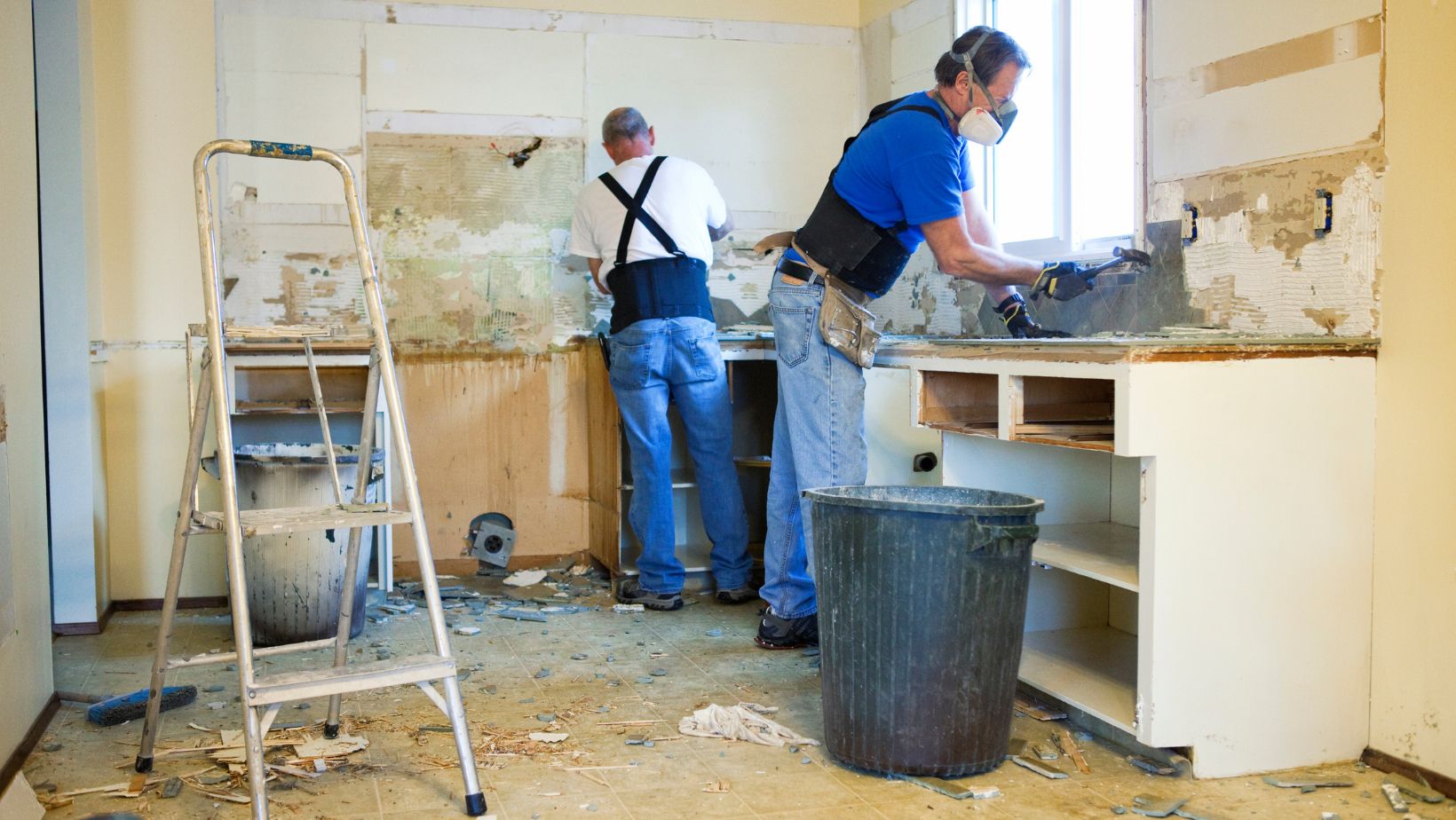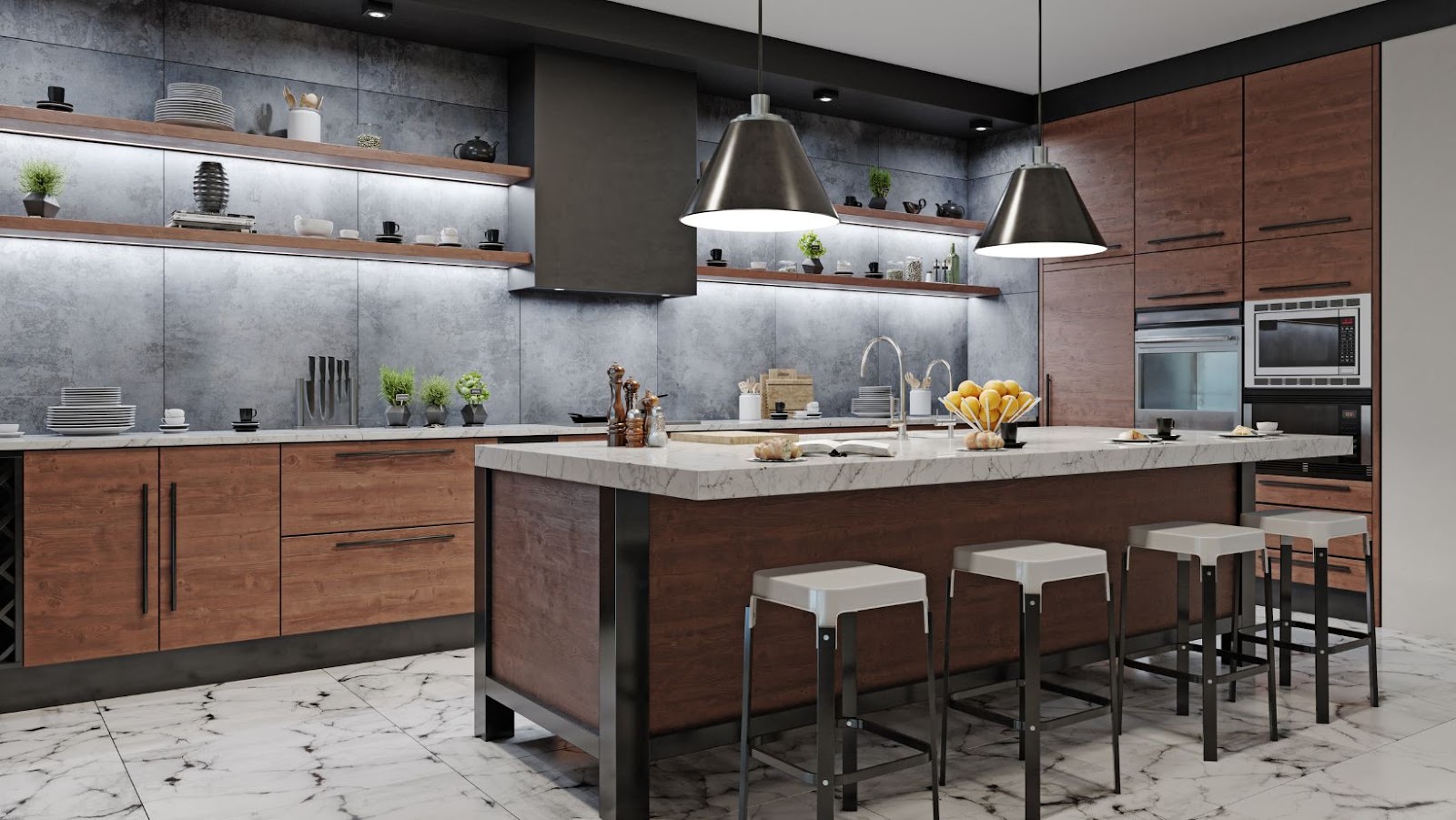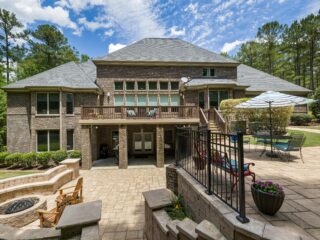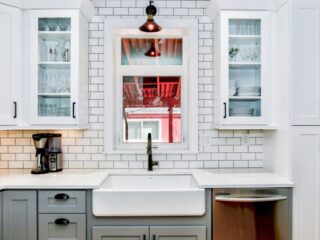
Creating a budget for your kitchen renovation project is one of the most important steps in the process. It helps you determine how much you can spend on each aspect of the project, how much time the project is likely to take, and it also helps you decide which features you absolutely must have and what features you can do without.
Establishing a budget is an essential step that will help ensure a successful kitchen renovation.
How do you determine a budget for kitchen renovation
When planning for a kitchen renovation, you may ask yourself “How do I determine a budget?” Establishing a budget and basing it on the current and future needs of your household can help you achieve your goals. Whether it’s to improve the look of your kitchen, increase the value of your home or just make life easier in the kitchen, focus on what will bring you the most utility.
Before making any decisions about your renovation budget, take some time to consider these basic financial questions:
- What does my current budget allow? Take into account all of your expenses including monthly bills and savings, before deciding how much money can go toward renovating your kitchen.
- What financial goals should be included in my budget? Make sure that any loan payments or other large expenses are taken into account during renovations so that they don’t cause any financial difficulties later on down the line.
- How much will materials cost? Research material costs prior to starting in order to get an accurate estimate of what things may cost and shop around for the best deals when possible.
- Are there additional costs I need to consider? Make sure you factor labour costs into your budget as well as other potential extras like storage solutions or electrical work that may come up during renovations.
- Do I need financing or assistance? If financing is necessary for completing renovations, make sure that you have considered interest rates and fees related to borrowing money when making a budget plan
Having realistic expectations about what funds are necessary for a project is important for success when taking on renovations – determining a renovation budget can help ensure that this happens!

Research the cost of materials
Research is the key to establishing a budget for a kitchen renovation. Knowing the approximate costs of materials, labor, and contractor fees can help ensure you set an accurate and realistic budget.
Start by researching the prices of different materials and products associated with kitchen renovations. Check the cost of cabinetry, countertops, flooring and appliances in-store or on websites like Houzz or Home Advisor to get an idea of what you should expect to pay for these items. Although you may want to look at high-end options, also consider what kind of cost savings are available if you were to go with a mid-range option instead.
In addition, be sure to factor in additional installation costs for new electrical wiring or plumbing that could be required during prep work for your kitchen renovation.
With research on pricing and good budgeting practices, you can easily determine what kind of financial allocation will bring your dream kitchen come alive.
Calculate the cost of labor
When setting a budget for your kitchen renovation project, it is important to consider not just the cost of materials, but also the cost of labor. How much it will cost to hire contractors and craftsmen who specialize in kitchen renovation will vary depending on their skill level, availability, and your specific needs.
To ensure that you set a realistic budget for your new kitchen, begin by researching local contractors and getting quotes from at least three different companies or individuals. As you compare prices, make sure you understand the services that are included or excluded from each quote, as well as whether the quote includes unforeseen costs like changes in options or materials.
Once you have chosen a contractor for the project, ask for detailed estimates of what is needed for all phases of the work being done. This may include services such as demolition, electrical wiring installation and appliance installation. Make sure these estimates are broken down so that you know how much time each job is expected to take and how much each will cost.
It’s also important to plan ahead for potential hidden expenses that may arise during the remodeling process. These costs might include paying extra if additional plumbing lines are needed due to existing limitations in the existing pipes or having custom cabinets fabricated if existing cabinet frames cannot handle additional weight placed upon them due to a heavy countertop material such as granite. Having an understanding of these potential expenses ahead of time can help you prepare adequately for them in your budget before starting your renovation project.
Benefits of a Kitchen Renovation Budget
Having a budget in place for your kitchen renovation project can help you avoid costly mistakes and ensure that the renovation fits your needs and preferences. Having a budget also allows you to be aware of how much money you can spend and plan ahead to ensure that you don’t overspend. In addition, a kitchen renovation budget will help you determine what types of materials and amenities you can afford.
Let’s take a look at some of the benefits of having a budget in place for your kitchen renovation project:
Save money on unexpected costs
When embarking on any home renovation, it is important to begin the process with a budget in mind. Determining a budget for kitchen renovation can be challenging at first, but it will save a homeowner from unexpected costs in the future. Establishing a realistic budget prior to beginning homeownership or renovation projects can help ensure that costs stay within the limits of what is financially feasible.
A kitchen renovation budget should take into account both necessary and unexpected expenses. While most homeowners will factor in anything related to replacing important fixtures like cabinet hardware and kitchen appliances, they may not consider how more abstract elements will fit into their plans. These elements include things like:
- Cooking classes
- Remedial electrical and plumbing work
- Updating electrical outlets and networking cabling
- Painting walls and ceilings
- Breakfast bar installation
- Shopping for accessories such as window treatments or chandeliers that fit the desired aesthetic
All of these details may fall through the cracks when attempting to adhere to a pre-set budget if not accounted for at the planning stage.
By creating a comprehensive kitchen renovation budget that accounts for both expected and unexpected expenses, homeowners are taking steps towards safeguarding themselves from going over their allotted spending limits. With proper foresight upfront and regularly tracking all costs associated with the project throughout its duration, this will ensure that you not only enjoy your newly renovated kitchen without breaking the bank, but also provide peace of mind should unanticipated obstacles arise during such an endeavor.
Stay within your budget
When it comes to kitchen renovation projects, having a clear budget in place is essential. Kitchen projects can become expensive very quickly due to the cost of materials, hiring contractors or other trades people, and the labor involved. It’s important to know how much you are willing to spend on a project before you begin so that you can stay within your budget.
When determining your budget, consider what aspects of the renovation are most important to you. Do you need all the latest appliances, or are there ways you can source cheaper alternatives? Are there services and products you can purchase at lower costs from local traders? Consider these factors when setting your workplace and decide where it is appropriate for you to skimp in cost to ensure that more expensive parts of the project are covered.
Once you determine a suitable kitchen smart renovations budget for yourself – accounting for your expected cost goals and what features absolutely have to be included in your dream kitchen – begin looking for ways that this amount of money can stretch far enough for all necessary elements of the renovation. With careful planning and consideration of each component part it is possible to find savings even in those costs that seem unavoidable or set too high at first glance. Having an established budget ensures that no matter how ambitious your plans may be they will still be achievable, allowing you complete freedom when designing without worrying about overspending on any single element of the overall design within limits determined by yourself and kept safe until completion as long as passion remains alive throughout every step of the project.
Avoid costly mistakes
When it comes to kitchen renovations, there is no such thing as simple or straightforward. Every detail should be carefully considered in order to ensure that you are getting the most for your money and making the best decisions for your space. This is why it’s important to create a budget before starting any project in order to reduce costly mistakes or issues down the line.
By taking the time to estimate your needs, prioritize essential aspects, and break down costs into manageable pieces, you can avoid making any impulse decisions that may end up costing more than originally planned. In addition, allocating funds toward particular aspects such as appliances, countertop materials, and cabinetry allows you to make appointments with contractors quickly while ensuring that all components meet safety requirements. Furthermore, by setting a firm budget beforehand you can anticipate potential roadblocks and develop an accurate timeline so everyone knows when specific tasks must be completed.
It’s also beneficial to factor in unforeseen repairs or additional upgrades that may come up throughout the process in order to account for any setbacks that could delay progress or increase costs beyond your original set goal. By staying organized and aware of the details involved throughout each step of remodeling your kitchen you can be confidently prepared for both wins and losses that come from increasing your home’s value through this exciting update – professional advice can also ensure that every last penny gets used on quality materials carefully selected just for you!
Creating a Budget
When it comes to kitchen renovation projects, creating a budget can be one of the most important steps in the process. Determining a budget for your kitchen renovation project can help you stay within your means and ensure that you get the most out of your kitchen renovation project.
In this article, we will discuss some tips for creating a budget for your kitchen renovation project:
Estimate the cost of materials
Creating a budget for a kitchen renovation can be intimidating, but with a well-thought-out plan, you can stay on track and make sure your project comes in under budget.
To start, it is important to estimate the cost of materials that are most likely going to be needed for the project. For example, countertops, cabinets, appliances and flooring will all need to be factored into the budget. You should also factor in any hidden costs that may arise such as delivery fees or installation charges for custom pieces. Consider researching online for quotes from reputable suppliers and also talking to friends or family who may have recently undertaken renovations that can help provide insight into approximate costs.
Another key factor when estimating costs is to account for any eco-friendly improvements such as energy efficient appliances or recycled materials when creating cabinets and counters.
Estimate the cost of labor
To accurately determine a budget for your kitchen renovation, it’s important to accurately estimate the cost of both labor and materials. The cost of labor is determined by factors such as the type of work involved, the size of the job, and the amount of time needed to complete it.
Before hiring a contractor or tradesperson for your kitchen renovation, gather detailed quotes from several different subcontractors to ensure that you are getting the most competitive price. Prices can vary widely depending on location, licensing requirements, and experience.
You will also want to consider any additional costs associated with permits or building code violations that might be needed.
When estimating labor costs, remember to factor in time for:
- Demolition and debris removal;
- Material delivery;
- Installation;
- Clean up; and
- Any other work involved in completing your remodel.
Make sure you have a clear understanding of all tasks included in each contractor’s estimated total hours so there are no surprises when it comes time to pay. Also remember to budget extra for unexpected repairs or additional materials that may be required throughout the project. A comprehensive estimate will help ensure you stay within your chosen budget throughout each phase of your renovation project.

Set a realistic budget
Developing a realistic budget is an essential step when planning for a kitchen renovation. In an ideal situation, your budget should include the cost of labor as well as materials. However, some people prefer to focus on the costs of materials in their budget first and then estimate how much labor will cost afterward.
By being realistic with setting a budget, there will be less surprises and fewer disappointments later on. Taking the time to analyze your finances and needs before you start will help ensure you make wise decisions while selecting materials, hiring contractors, or taking on aspects of the project yourself.
When deciding on your kitchen renovation budget, it’s important to consider the following factors:
- The size of your kitchen
- How much work needs to be done (minor upgrades or a complete overhaul?)
- What type of remodel do you want? (modernization or restoration)
- The quality of materials that you select
- Whether you need to hire contractors for electrical/plumbing work
- Costs associated with removing/disposing existing elements from the kitchen
With careful planning and research, you’ll be able to create a manageable budget that keeps your project within financial constraints -allowing for more flexibility when making decisions throughout the process.
Ways to Save Money
Kitchen renovations can be an expensive undertaking, but with careful planning and budgeting, you can save money and still get the kitchen of your dreams. Determining a budget for your kitchen renovation is essential for ensuring you make the most efficient use of your money.
In this article, we will explore some ways to make the most of your budget by considering various factors such as the appliances, materials, and labor costs:
Shop around for the best prices
Shopping around for the best prices is a great way to save money when renovating your kitchen. It’s important to compare different contractors and stores, so you can get the most competitive price and value. Take your time to investigate the different offers available and make sure that you’re happy with them before proceeding.
Other ways to save money while shopping include:
- Looking for discount codes, deals and promotions from suppliers, as well as checking out clearance items from major retailers.
- Many home improvement stores offer DIY kits or supplies specifically designed for kitchen renovations.
- Visiting home renovation shows can also provide inspiration for budget-friendly options that fit into your space requirement and vision.
- Browsing through magazines for ideas on DIY solutions or explore websites of professional suppliers for additional tips on cheap solutions that achieve great results.
Finally, it’s a good idea to set a realistic budget before beginning any type of kitchen renovation project – this ensures that you’re clear about how much you have to spend and can plan accordingly. Don’t be afraid to ask questions if there are any unclear costs associated with specific products or services – this will help ensure that there are no hidden expenses down the line which could blow your budget out of proportion. By following these steps and planning ahead, you’ll be well on your way to creating a modern kitchen space within your financial limits!
Consider DIY projects
DIY projects can be a great way to cut costs on a kitchen renovation. While it’s important to remember that some DIY jobs require a lot of technical knowledge and skill, there are still plenty of simpler ones that you can do yourself with no extra help or supplies. Consider painting cabinets, laying new tiles, or installing simple hardware elements like handles and pulls.
If you decide to tackle any DIY tasks, be sure to make a list of everything you’ll need before you start. Pay special attention to the safety measures you need to take – when working with power tools, for instance – and if in doubt whether it’s something you can complete by yourself, consult with an experienced professional before starting work. Finally, budget enough time for the project on top of the money: doing things yourself will inevitably take more effort than hiring someone else!
Reuse and repurpose existing materials
When renovating or remodeling your kitchen, one of the best ways to save money is to reuse and repurpose existing materials. This is a great way to reduce construction costs and the cost of purchasing new materials for your project.
If possible, try to reuse existing cabinets, countertops, appliances, hardware, and other materials that can be easily salvaged before replacing them. Even small details such as door handles or lighting fixtures can be reused and incorporated into your new design with relative ease. Reusing existing resources helps you reduce project costs without sacrificing quality or visual appeal. Additionally, by reusing materials you’re doing your part in helping the environment.
Conclusion
A kitchen renovation budget will ensure that the best project options are within reach. When the process has been well-planned and the proper budget has been set, renovations will be smooth and efficient.
From selecting materials and appliances to labor costs, a kitchen renovation budget can provide you with the peace of mind of knowing that the project will come together just as you imagined.
Summary of the benefits of a kitchen renovation budget
Setting a budget for any renovation can be daunting, and kitchen renovation budgets can seem particularly intimidating. Having a plan in place before the project starts, however, will help ensure you have realistic expectations and stay on track financially. Establishing a comprehensive budget for the project benefits both the homeowner and contractor alike and can provide peace of mind throughout the process.
A well-constructed kitchen renovation budget should consist of four components: expected costs, overages, contingency funds and incidentals. By having an understanding of all the pieces that go into a kitchen renovation cost, it is possible to keep your project within your means while still achieving all the desired upgrades.
- Expected costs include all non-negotiable aspects of the project such as labor or permits.
- Overage funds account for unexpected expenses that may arise during demolition or plumbing work;
- Contingency funds are set aside to cover any additional materials needed once construction begins;
- Finally, incidentals cover any smaller surprises that can come up as work progresses such as improved fixtures or higher quality finishes.
Having an accurate budget allows you to anticipate any unwanted surprises down the road while also giving you ample flexibility to make changes if they’re needed throughout the process. By taking some time to carefully calculate costs ahead of time you ensure both yourself and those working on your renovation are prepared for whatever comes up; establishing an effective kitchen renovation budget need not be overwhelming if taken step by step.
Final thoughts on how to create a budget for a kitchen renovation
A kitchen renovation is an exciting prospect that can bring value and enjoyment to your home. With careful planning and consideration, a budget should be crafted that will ensure you get the most out of your renovation while keeping your finances in order.
To create an effective budget, you must plan far in advance, including research to understand the unique aspects of your renovation project. Once you have a better understanding of the type of materials you wish to use, the cost of those items, prevailing labor rates for contractors in the area, and potential return on investment (ROI), you will be able to create a realistic budget for your renovation.
It is also important to ensure that minor costs are taken into account that may otherwise be overlooked such as taxes and utility bills during construction. Creating an accurate timeline with milestones and buffer factors will also minimize any unforeseen expenses so unexpected issues can be handled without forfeiting your financial goals.
Utilizing these tips when creating a kitchen remodel budget can help make sure you don’t come up short on either style or money after completing the project!
- Plan far in advance, including research to understand the unique aspects of your renovation project.
- Understand the type of materials you wish to use, the cost of those items, prevailing labor rates for contractors in the area, and potential return on investment (ROI).
- Take into account minor costs such as taxes and utility bills during construction.
- Create an accurate timeline with milestones and buffer factors.





